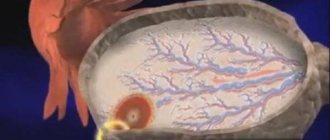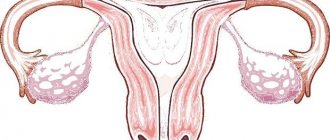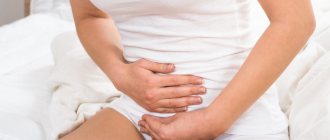Before the onset of menstruation, many women experience a tightening in the lower abdomen. What can happen if your period never comes and the pain continues? The reasons for this can be very different. In any case, if the lower abdomen is tight, but there are no periods, this is a certain signal from the body that requires close attention. Therefore, you should carefully study the accompanying sensations, if any. All this clearly indicates a violation of the female cycle and the need to consult a doctor.
My stomach hurts, but I don’t have my period – is this normal? Doctor's answer
If you ask your gynecologist about this question, he will not be able to immediately give you a clear answer. To find out the reasons for the lack of bleeding, it is necessary to undergo diagnostics. First of all, the doctor clarifies the duration of amenorrhea. In this case, suspicion immediately falls that the patient is pregnant. After this, a gynecological examination is performed on a special chair. During it, the doctor will take a smear for analysis to determine the state of your microflora. Next, additional studies are prescribed. In most cases, one ultrasound examination is sufficient to clarify the circumstances. However, your doctor may recommend donating blood to determine your hormone levels.
It is worth noting that in some cases, abdominal pain and lack of menstruation are a normal physiological process. However, pathology cannot be excluded. Let's look at the main reasons why your stomach hurts but you don't have your period. There may be at least five reasons for this state of the body.
Delay as evidence of illness
Inflammatory processes
One of them is called various gynecological diseases. Therefore, when the lower back hurts, the lower abdomen is pulled, menstruation is delayed, and there is also vaginal itching, bloody discharge with an unpleasant odor, pain when urinating, these may be inflammatory processes:
- Vaginitis: inflammation of the vaginal walls, characterized by pain comparable to contractions and extending to the lower back, a large amount of discharge, itching;
- Adnexitis: inflammation of the ovary. Sometimes the disease proceeds secretly and can cause a delay of 3-5 days, so you need to visit a doctor so as not to start it;
- Endometritis: inflammation of the lining of the uterus, characterized by pain and bleeding.
If, in addition to pain in the lower abdomen, vaginal itching, spotting and discomfort when urinating make themselves felt, this may be the beginning of an inflammatory process
Gynecological diseases
When there is a delay in menstruation, there is tension in the lower abdomen and lower back, white discharge similar to a cheesy mass with a characteristic sour odor, irritation of the skin and vaginal mucosa occurs, this indicates the disease “thrush”. This disease is caused by the fungus Candida. In this case, you should not self-medicate; qualified assistance from a gynecologist will help you get rid of the disease faster.
Diseases of the reproductive system
Signs such as delayed menstruation, pulling in the lower abdomen and lower back, can also be observed in diseases of systems not related to the reproductive system, for example, the kidneys and bladder (cystitis, pyelonephritis). But here the temperature rises for 2-3 days, and a delay in menstruation is possible due to the close proximity of the urinary and genital organs. A problem in one of them affects the others.
Lesions of the gastrointestinal tract
Damage to the gastrointestinal tract can also cause pain: inflammation of the intestine (colitis), the formation of adhesions and hernias in it, appendicitis and other diseases can also delay the onset of menstruation by 3-4 days. Therefore, it is necessary to distinguish the nature of the pain, in this case:
- pain in the abdomen will be pulling, cutting, stabbing;
- may pull the lower back;
- bloating, diarrhea, or constipation;
- temperature increase.
Problems with the gastrointestinal tract can cause pain in the back and lower back; the disease can delay the onset of menstruation for several days
If you receive a negative response to testing, after making sure that there is no pregnancy, do not look for the cause of the deviation yourself, consult a doctor so that the examination and treatment can be carried out on time.
Source of the article: https://ovulyaciyatut.ru/sovety/pri-zaderzhke-mesyachnykh-tyanet-niz-zhivota-i-poyasnitsu.html
Pregnancy in a woman
If your stomach hurts, but you don’t have your period (the test is positive), then this indicates the onset of fertilization. During menstruation, the cavity of a woman's reproductive organ is cleansed. Next, the hormone estrogen begins to be actively produced. It affects the endometrium - the mucous layer of the uterus. It builds up over the course of several weeks.
After ovulation, progesterone comes into effect. This hormone also has a beneficial effect on the endometrium, preparing it for implantation. If fertilization has occurred, then the resulting set of cells is embedded in the loose mucous membrane. This process provokes further production of progesterone. Because of this, a woman notices a delay in menstruation. Abdominal pain in this case is a consequence of damage to the inside of the uterus. However, this sign may indicate a threat of interruption of the new state. This is why you should consult a doctor.
How to distinguish pregnancy (including ectopic)
Any woman who has regular sex life, with nagging pain in the lower abdomen and delay, thinks about pregnancy. The easiest and fastest way to determine is test strips. But these remedies may show an incorrect result and, if the pregnancy is very short, the test will not show it. For this reason, it is recommended to be examined by a gynecologist and undergo some tests. As a rule, most women at the beginning of pregnancy experience chest pain, irresistible cravings for certain foods, morning sickness, weakness, drowsiness and heightened perception of smells.
With an ectopic pregnancy, the stomach can hurt very much
If a woman has previously had a sexually transmitted infection and was treated for inflammation of the reproductive system, then she runs the risk of having an ectopic pregnancy. It is almost impossible to identify the pathology on your own, so an examination by a doctor is required. Signs of a normal pregnancy will also accompany an ectopic pregnancy. However, the level of hCG hormone in the blood below normal is a direct sign that the fertilized egg is developing outside the uterus. Normally, the hCG level doubles every second day. With an ectopic pregnancy there is no such surge.
Anovulatory cycle: normal functioning of the body
Why does it happen that your stomach hurts, but you don’t have your period? A negative test indicates that the woman is not pregnant. Everything is explained quite simply.
A healthy representative of the fairer sex ovulates every month. At this moment, an egg is released from the dominant follicle. However, there may also be periods when the ovaries simply rest. In this case, the cycle is called anovulatory. It is worth noting that during such periods the balance of estrogen and progesterone is disrupted. This often results in a slight delay. Women note that during anovulatory cycles, menstruation is delayed by no more than a week. In this case, pain is felt in the lower abdomen.
Understanding the causes of pain in the lower abdomen
Why does a woman's lower abdomen hurt if she doesn't have her period? Causes:
- Excessive load
If the body is given excessive physical activity, the body turns on the “save” mode. Review your daily routine. Avoid going to the gym for a while and make your lifestyle more passive.
- Low weight, lack of calories
These two factors are characteristic of a low percentage of body fat. This indicator is individual for each woman. Some people can have their periods even with 12% body fat, while others can only get their periods with 25%. If you find these symptoms in yourself, then reconsider your views on nutrition. Add more foods with healthy fats (meat, flax or wheat germ oil, butter).
- Hormonal imbalances
After 30-35 years, a woman’s body begins to slowly change, and her hormonal balance changes. The amount of estrogen increases, which leads to an imbalance in its alliance with progesterone. If there is no balance, then there will be a delay in menstruation.
- Stress
As mentioned above, during stress the body turns on the “save” mode. Why is reproductive function disabled? Because menstruation is the most energy-consuming process. If they are there, it means “everything is fine and you can give birth,” that is, the body “understands” that you are able to feed your offspring.
If something is wrong, then the balance of hormones is disturbed due to the predominance of cortisol. As a result, the body “understands” that now is not the best time to give birth to a child.
- Pregnancy
The reason for the delay of menstruation is a tumor in the pelvis
It happens that your stomach hurts, but there are no periods (but there should be). That is, the woman knows for sure that she is not pregnant. What is the reason for the lack of discharge in this case?
Doctors say that amenorrhea can be caused by a tumor process. Moreover, its most common location is the ovaries. Various benign and malignant tumors can cause delayed bleeding. Among functional cysts, follicular formation can be distinguished. It almost always becomes the reason for missing periods. The woman feels slight pain in the lower abdomen due to an increase in the size of the ovary.
What to do if your period is late, the test is negative and the lower abdomen is pulling
A delay in menstruation is considered an invariable sign of pregnancy, as well as the fact that the lower abdomen is pulled at the same time, but sometimes a test carried out in such a situation turns out to be negative. This situation can be considered a serious reason, which requires immediate contact with a doctor. In this case, one should also take into account the presence of such signs as the appearance of nausea and pain, because in fact they can indicate a developing pathological process.
Hormonal imbalance and the influence of external factors
My stomach hurts, but I haven’t had my period for a week or more. Why is this happening? In this case, we may be talking about hormonal imbalance. In most cases it is caused by external irritants. These include fatigue, illness, stress, climate change, and so on.
Most likely, menstruation will begin on its own. Moreover, if the stomach hurts, then the contractile work of the uterus has already begun. However, to speed up the process, you should contact a gynecologist or endocrinologist. With the help of modern medications, you can quickly induce menstruation and restore the cycle.
Why does your stomach hurt?
The first cause of discomfort is pregnancy. Pain is normal at the beginning of fetal development. This is due to the production of hormones and changes in the size of the uterus. If conception is excluded, then the listed factors should be in the woman’s field of vision in order to determine the cause in time and take action.
- Hormonal imbalance. It occurs against the background of uncontrolled use of hormone-containing drugs, as a result of poor functioning of the thyroid gland and pancreas, as well as severe weight loss and inflammation of the ovaries.
- Formation of tumors or cysts in the uterus and/or ovaries.
- Endometriosis (growth of the inner walls of the uterus).
- Restructuring of the body associated with menopause.
- Inflammation of any localization.
- Strict diet, fasting.
- Climate change.
- Nervous shock, prolonged stress, depression.
- Long-term use of medications. Intoxication of the body occurs. As a result, almost all body systems fail.
As a rule, with the listed signs, the stomach hurts and a delay in menstruation lasts up to 10 days. All this time, the woman feels like during PMS: she periodically has a headache, craves sweets, her mood changes sharply, and her breasts swell.
Every woman should periodically drink chamomile or linden tea. Linden contains flavonoids, which prevent hormonal imbalance, and chamomile contains antibacterial substances that suppress the growth of infections.
You should listen carefully to your condition to see if the pain is increasing. It is possible that the woman has intestinal or renal colic or chronically inflamed appendicitis, or acute appendicitis, which requires immediate hospitalization. You cannot relieve pain with antispasmodics or painkillers until you find out exactly where it is located and what caused it.
Inflammatory process: adnexitis or metritis
Inflammation can cause delayed menstruation and abdominal pain. It usually affects the uterus. In this case, we are talking about metritis or endometritis. The ovaries (adnexitis) and fallopian tubes (salpingitis) may also be involved in the process. In more advanced situations, the disease spreads in several places at once. The most dangerous form of inflammation is peritonitis. It affects the mucous membrane of the peritoneum.
Often inflammatory processes of this nature occur after sexually transmitted infections. In most cases, treatment was not carried out or was chosen incorrectly. The acute form of the pathology is characterized by symptoms such as fever, weakness and unusual discharge. Chronic inflammation is not as severe, but is a more dangerous enemy. In both cases, the woman experiences a delay in menstruation and abdominal pain.
Other reasons
When a woman is 6 days late and the pregnancy test is negative, it may be inflammation of the urinary tract - cystitis, pyelonephritis. With kidney disease, there is a lack of progesterone, which is produced not only by the corpus luteum of the follicle, but also by the adrenal glands. Due to a lack of the hormone, menstruation is delayed.
Both acute and chronic cystitis are a constant source of infection. Ascending infection can spread to the ovaries. As a result, their functions are disrupted, namely the production of hormones, hence the delay of menstruation.
Disruption of the gastrointestinal tract can also cause a disruption in the menstrual cycle. These could be adhesions or intestinal hernias, tumors or appendicitis. Symptoms such as severe pain, nausea, vomiting, diarrhea or constipation are present. In any case, menstrual irregularities and pain require attention and consultation from a specialist.
https://www.youtube.com/watch?v=CMs4lKy0LHY&t=2s
Incorrect calculation of the day of the cycle: female error
Why does it happen that your stomach hurts but you don’t have your period? The reason may be that the loop is calculated incorrectly. Quite often, women forget when they last had bleeding. This leads to the fact that the date of the next menstruation is calculated incorrectly. In most cases, it shifts by 7 days, since many representatives of the fairer sex count their menstrual cycle in weeks.
Pain in the peritoneum is of a different nature. Quite often, such symptoms are caused by pathologies of the intestines or bladder. Women mistake them for premenstrual symptoms and wonder why their stomach hurts but bleeding does not begin.
Pregnancy
Starting from the first day of an unexpected delay, each of you will begin to worry. But in most cases, any representative of the fair sex should feel on a subconscious level that something is wrong. However, one, two or even six days should not be scary. A delay of more than one week is an initial cause for concern.
A delay in menstruation pulls the lower abdomen - this is a reason to think about several situations at the same time.
The first and most pleasant thing for those who are expecting is pregnancy. At the same time, all or individual symptoms similar to PMS may appear at once. If you “worked” on this or unprotected sexual intercourse occurred, then the expectant mother must immediately compare everything and figure it out, especially when, in addition to everything, there are attacks of nausea and dizziness.
Nagging pain in the lower abdomen during pregnancy at the initial stage occurs for the following reasons:
The fastest and bravest sperm, having reached the egg, formed a zygote with it. This small cell must move to the uterus to settle there, grow and develop like an embryo, but its long journey goes through the fallopian tubes. This takes about a week or a week and a half. If we take into account that fertilization occurred at the peak of ovulation on the 12th day of the menstrual cycle, then by the end of the last cycle the egg with the rudiment should find itself at its “destination”, which means that nagging pain indicates one of two situations - the next menstruation or a significant stage in your life. life.
In fact, to put it simply, the body is undergoing a restructuring and, in particular, the reproductive system. The uterus should expand and become a “house” for the future newborn. All these changes entail strange feelings in the lower abdomen.
How to determine if your period is late
The menstrual cycle normally lasts 21-35 days. The absence of discharge for more than 5-7 days is a reason to consult a doctor. You need to do a pregnancy test at home. If the test is negative, the gynecologist prescribes hysteroscopy. This procedure allows you to examine the uterine cavity to determine pathologies.
A delay in menstruation is divided into three stages:
- 1. Menstruation is 5-7 days late from normal.
- 2. A disorder in which the menstrual cycle lengthens to 40-60 days. Fluid release occurs over 1-2 days.
- 3. Absence of menstruation for more than 6 months.
The standard delay in a healthy woman occurs no more than 2-3 days. A deviation is considered to be an extension of the cycle for a week or more. Women over 45 years old suffer from hormonal imbalances, which indicate the approach of menopause. The discharge will be scanty and the cycle will lengthen.
Other reasons for lack of menstruation
Abnormal curvature of the uterus
Often the menstrual cycle is accompanied by pain in the lower abdomen. But the absence of discharge with nagging pain indicates the presence of diseases
.
Common pathologies in which menstruation is delayed:
- Congenital curvature of the uterine body. At the age of 12-14 years, the first menstruation appears. The abnormal position of the uterus manifests itself from the first days of menstruation. The person feels a nagging pain. The temperature rises and the general condition of the body deteriorates. White discharge with an unpleasant odor indicates the presence of purulent processes. The curvature of the uterus leads to the accumulation of secretions in its cavity. Menstruation becomes spotting. It is clotted and dark red in color.
- Tumors and adhesions. In this situation, blood accumulation and absence of menstruation also occur. A woman needs to undergo examinations to determine the exact cause of the blockage of the lumen.
- Atrophy of the mucous membranes due to hormonal imbalance. The epithelium does not separate from the uterus, so menstruation does not begin. This occurs in elderly women or after suffering from severe infectious diseases.
Less common reasons:
- overwork;
- stress;
- infectious diseases;
- urolithiasis disease;
- endometriosis;
- varicose veins;
- cystitis;
- colitis.
What to do
It is prohibited to treat the absence of menstruation using folk remedies. Some pathologies can lead to infertility, so you should seek qualified help and advice from a hospital. You should take a pregnancy test several times. Moreover, they must be from different manufacturers so that the false result is reduced to zero.
Treatment for absence of menstruation:
- Abnormalities in the position of the uterus are corrected through surgery. This must be done as quickly as possible to avoid problems conceiving a child in the future.
- Adhesions of the intrauterine space are determined during hysteroscopy. Treatment is carried out on an outpatient basis using curettage. The top layer of the uterine lining is removed. There are no periods for one month after the procedure. Sometimes adhesions occur due to hysteroscopy. Then it must be done again.
- Atrophy of the mucous membranes of the uterine cavity is treated with hormonal therapy. The gynecologist prescribes medications after examination. A woman's blood is taken and her estrogen levels are determined. After 2-4 weeks of therapy, the supply to the uterine mucosa returns to normal.
- Varicose veins of the pelvic vessels lead to nagging pain in the lower abdomen. A woman’s lower back is constantly aching, but this is not evidence of an imminent period. Varicose veins expand to abnormally large sizes. There is a risk of rupture of the vessel, so surgical intervention is necessary.
- The main reason for the development of cystitis is hypothermia of the pelvic area. The risk group includes people with a sedentary lifestyle. The disease appears in women who do not take care of genital hygiene. In acute cases of the disease, antispasmodics and antibiotics are prescribed. You should stay in bed and drink plenty of fluids.
- If you have colitis, you should consult a gastroenterologist. He will prescribe a diet and the necessary treatment based on the symptoms of the disease. Antibacterial and antimicrobial drugs are used to treat the disease. If helminths are the cause of colitis, then antihelminthic drugs are prescribed.
- Urolithiasis is treated in two ways. The first method is more gentle. It involves medication to get rid of kidney stones. Such drugs soften them, and the body removes them through the urinary canal. If a stone blocks the entrance to the kidney, surgical intervention is prescribed. In this case, you should get rid of the problem as soon as possible. Otherwise, there is a risk of kidney loss.
- Severe stress and overwork significantly affect a woman’s menstrual cycle. With constant nervous tension, it is necessary to change the environment and remove the irritant from your life. Sedatives will help calm you down. Together with them, it is advisable to take a course of vitamins B12, D, E. They have a beneficial effect on the tissues of the nervous system and help its recovery after stress.
- After suffering a viral illness, you should add foods containing large amounts of vitamins to your diet. During this period, a woman needs plenty of fluids and rest. Stress and physical activity should be avoided whenever possible.
Before the onset of menstruation, many women experience a tightening in the lower abdomen. What can happen if your period never comes and the pain continues? The reasons for this can be very different. In any case, if - this is a certain signal from the body that requires close attention. Therefore, you should carefully study the accompanying sensations, if any. All this clearly indicates a violation of the female cycle and the need to consult a doctor.
The cause for concern may be the most serious, for example, the formation of a cyst or a sexually transmitted infection. Or it could just be an ordinary hormonal imbalance due to stress. Or perhaps the body is letting you know about the onset of early pregnancy. A detailed and broader discussion will help to understand each possible case in more detail.
Onset of pregnancy
A woman’s usual thoughts immediately after a delay of literally 3–4 days are, of course, pregnancy. Checking this version is not at all difficult; just use a pregnancy test. If the assumption is confirmed, the question of nagging pain in the lower abdomen disappears. Pain syndrome is always normal for the first days after fertilization. In addition, you may see:
- in small quantities;
- nausea;
- swelling of the mammary glands.
But if the test is negative, and there are no periods, but nagging pain is present, this becomes a cause for serious concern. Pregnancy may be at risk.
Risk of miscarriage
It is in early pregnancy that the risk of miscarriage is highest. If there is no suspicion of fertilization, and no symptoms have appeared, then, most likely, abdominal pain indicates that your period is about to begin. But if signs of pregnancy appear, and the test confirms the situation, then the pain syndrome can be a signal of a threat of miscarriage. The woman needs to see a doctor immediately.
In most cases, if you constantly begin to stretch your stomach more and more in the early stages of pregnancy, this is a symptom of uterine tone. If you do not consult a doctor in time and take the necessary measures, the pregnancy may be terminated.
In addition, the cause of nagging pain in the absence of menstruation and with a negative test can be an ectopic pregnancy. In such a case, usually, but only on one side. It will be possible to verify a possible fact of this kind with the help of an ultrasound examination.
Hormonal disorders
The absence of menstruation often indicates a hormonal imbalance and is often accompanied by a nagging pain syndrome. In general, nothing bad happens in this case; it can happen to any woman. The cycle simply shifts, and under the influence of hormones various spasms and discomfort appear.
The synthesis of prostaglandin hormones causes similar symptoms, various unpleasant sensations and a pulling pain syndrome. The uterus may begin to contract more actively. Usually menstruation follows, which is also painful. Also often present:
- nausea;
- irritability or apathy;
- insomnia and other unpleasant phenomena.
There are several reasons for hormonal imbalance, with poor health and delayed menstruation:
- frequent stress;
- intellectual loads or strong emotions.
Strong emotional outbursts during the month, as a rule, give their characteristic negative results. Hormonal disorders can be directly related to them.
High physical activity or its complete absence - such phenomena can easily provoke a disruption of the female cycle. In this case, the delay and nagging pain in the lower abdomen does not pose a great danger, but from now on you need to monitor your health more carefully.
Changing climatic conditions is always a certain stress for the body. Therefore, the reverse reaction is unpredictable; late periods, accompanied by nagging pain, are quite likely.
Thinking and body are directly dependent on each other. The state of mind cannot but affect the general physical condition. Very often, a failure in the production of hormones is caused by a restless moral and mental state.
Infections or inflammatory processes
If, as during menstruation, but there are no periods, then this may indicate serious inflammatory processes and gynecological diseases or infections in the genitourinary tract.
The most common infectious diseases that can begin with nagging pain are:
- vaginitis;
- endometritis;
- fibroid or cyst;
- adnexitis;
- venereal infections.
In order to accurately determine the disease, and in general, to ensure its presence, you need to consult a doctor. He will conduct the necessary examination, give directions for tests, and then make a diagnosis and prescribe treatment. The most common cause of this type of infection is unprotected sexual intercourse.
When should you not hesitate?
But sometimes the reasons why the lower abdomen hurts like during menstruation, but it does not occur, may require immediate medical intervention. This is necessary in the following cases:
- Pregnancy. Prolonged pain during pregnancy is not normal and can be dangerous, as it indicates muscle tone of the uterus, and this can lead to spontaneous abortion;
- , the onset of which, as a rule, requires urgent surgical intervention. In this case, the stomach hurts in an uncharacteristic way, the malaise is accompanied by accompanying symptoms: dizziness, nausea, chills, discharge to the rectum, fever;
- Gynecological diseases: stagnation of blood in the pelvis, varicose veins of the small pelvis. If the stomach hurts both earlier and later than the expected period of the onset of menstruation, they are called acyclic;
- Inflammatory processes in the reproductive system: salpingitis, adnexitis, rupture. With fibroids, pain may be accompanied by swelling, discomfort in the chest, the pain comes suddenly, can last for quite a long time and also suddenly recede;
- inflammatory processes in other abdominal organs: diverticulitis, appendicitis, intestinal inflammation;
- Diseases of the urinary system: urolithiasis, cystitis, pyelonephritis, colitis. The pain intensifies when urinating, blood or sand may appear in the urine;
- Imbalance of hormones, dysfunction of their formation and secretion. Each phase of the menstrual cycle is characterized by a certain ratio of hormones secreted by the pituitary gland. Violation of this ratio leads to an unnatural course of the cycle and the occurrence of unpleasant sensations. Thus, an increase in progesterone and prostaglandins stimulate contraction of the uterine walls, causing pain. During treatment, medications are prescribed that suppress the synthesis of these substances in the body;
- The presence of a hernia, distortion, pinched nerves of the lower spine.
All these reasons, accompanied by pain and associated symptoms, are good reasons to consult a doctor. First of all, go to a gynecologist when you suspect ailments in the feminine area. If you have symptoms of urinary system diseases, you should rush to see a urologist. It is necessary to conduct an examination of all internal organs - take tests, do an ultrasound.
It would not hurt to consult an endocrinologist to study hormonal levels and the state of the thyroid gland, which regulates their production.
If contacting the above specialists does not reveal any pathology, it is also necessary to check with a neurologist and do an MRI of the spine in order to detect hernias and other changes in the spine.









